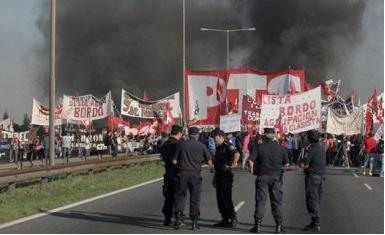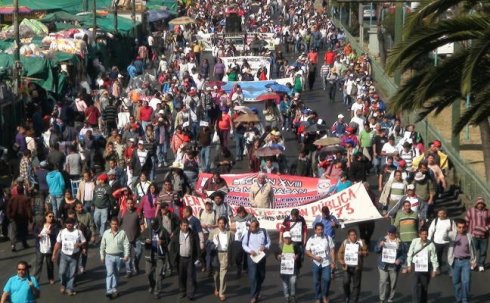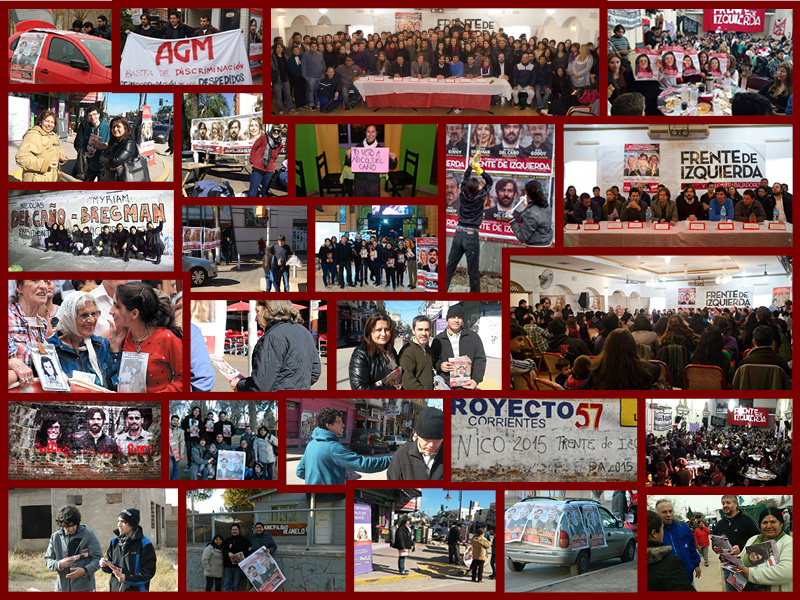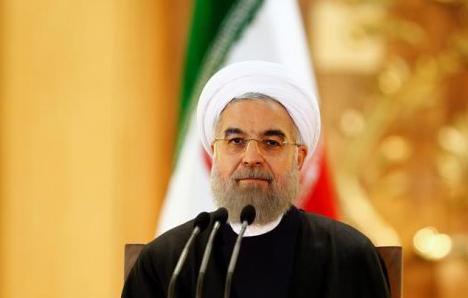14N: Tendencies towards the unification of the workers’ struggles in Europe
For a General Strike and Mobilizations on the entire continent against the Europe of capital
13/11/2012
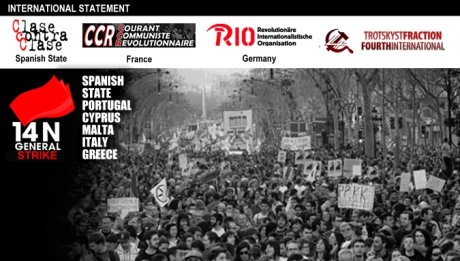
Statement of Clase contra Clase (Class against class) from the spanish State, CCR4 NPA (New Anticapitalist Party) from France, Revolutionary Internationalist Organization from Germany.
On November 14, there will be general strikes in Spain, Portugal, Cyprus, Malta –and possibly in Greece – Italy will join the action with a 4-hour strike. Also, there will be mobilizations in other European countries like France. In spite of its limits, this is the most massive answer which the workers have yet given to the austerity plans. It is a new act in the resistance to a historic crisis which the governments and the capitalists are forcing onto on the workers, the precarious youth, the poor masses and the ruined middle classes.
Since 2009-2010, the European governments have been applying strict plans of “austerity” in the countries where the crisis hit hardest, while their reactionary measures are extending, albeit until now in a more limited way, to others such as Hollande’s France. The bourgeoisies of the most important imperialist powers of the Eurozone, with Merkel at the front, are trying to make the workers pay the biggest part of the enormous cycle of debt created in the previous period of growth and the enormous rise of state spending – created by the rescue of banks and big corporations as a result of the crisis. At the same time, they are trying to liquidate all the conquests which the workers’ movement won in years of struggle, as a step to restructuring of working conditions in the interest of capital, which could reposition the most important European powers in the fierce world-wide competition.
The political crisis is deepening: They don’t represent us!
The capitalist crisis is accelerating the crisis of the different political regimes, which is expressed in the discredit by the principal parties which apply the cuts – social-democratic (like the Greek PASOK or the PSOE in Spain) as well as conservative ones. The cry of the “indignant” in the Spanish State in May 2011 – “They don’t represent us!” – is an expression of a profound and generalized feeling, fundamentally among young workers and students. In this context, new right-wing and left-wing political alternatives have been strengthened, leading to phenomena of political polarization.
On the right-wing side, xenophobic and directly neo-nazi tendencies like Golden Dawn in Greece or more populist tendencies like the National Front in France have been strengthened. As an answer to the seriousness of the social crisis and the offensive of German imperialism against the weakest states in the EU, these sectors demagogically put forth programs of “sovereignty” or “protectionism”. Golden Dawn centers its attacks on immigrants, and to a lesser extent on the left, but with the deepening of the crisis they will be used against the organizations of the workers and the masses.
On the other hand, left-wing reformist currents have been strengthened, like Syriza in Greece, or the Front de Gauche in France. But as an answer to the seriousness of the capitalist crisis, they only offer programs of reforms within the framework of the EU. We have witnessed an increasing moderation of their discourse in order to occupy electoral spaces in the light of the crisis of the social-democracy, like what happened when Syriza changed their demand “No to the payment of the debt!” to “Renegotiation of the debt” only days before the elections. They position themselves as the left flank of the neo-Keynesian financial front that reaches from Hollande to Obama, which is trying – until now with little success, like the French president’s policies of cuts and tax increases is showing – to present an alternative imperialist policy to Germany’s “austerity”. Other reformist sectors propose solutions based on devaluation, like the KKE in Greece. None of them offer a real alternative to the workers and the poor masses facing the crisis.
For a European general strike
Before November 14 and only counting the year 2012, there have been six general strikes in Greece – and 23 in total since 2008 –, one in the Spanish State – where for the first time in history, there will be two general strikes in one year –, two in Portugal in addition to various mobilizations which caused a retreat of the conservative government, one in Belgium, one strike of public sector workers in Great Britain, the first mobilizations in France against the “socialist” government supported by the trade union leaderships, showing the first symptoms of a recomposition of the fighting sectors after the political defeat in the great struggle against the pension reform of 2010, in addition to massive demonstrations in Italy, the Czech Republic, Romania, Slovenia and recently Croatia against austerity measures.
All of this constitutes a wave of resistance to the measures coordinated by the Troika and applied by the governments in the interest of the bosses and the bourgeoisie, in the countries of the north of Europe and in the south. We have to add the emergence of the youth, the “indignant” in the Spanish State and Greece, the “Occupy” movement in London, the student movement in Italy, Spain and other countries; but there are also sectors – which are still marginal: in Germany which are beginning to move, like “Blockupy” or the refugee movement in Berlin. In Greece, there will be a new general strike of 48 hours on 6 and 7 November against a fresh draconian package of austerity measures.
All this energy and the tendency toward unity between the workers and the “indignant” youth need to express themselves strongly in the general strike in the south of Europe on November 14. It must be prepared actively by the rank-and-file, with assemblies and strike committees in each workplace and place of study, calling for the broadest unity and mobilizations as a begin of a generalized plan of struggle.
The trade union bureaucracies are doing exactly the opposite. In different countries, they are calling for isolated strikes or demonstrations as part of a policy to pressure European governments so that they "moderate" the austerity plans, without preparing an answer at that corresponds to the level of the crisis and without questioning the principles of the EU. Faced with the austerity plans coordinated by the Troika, we are part of the struggle against the cuts and for the defense of workers’ hard-won rights that are under brutal attack. It is necessary to develop the potentiality of the general strike, with unity from below and the generalization of organs of self-organization to overcome the policies of "pressure and negotiation" of the European trade union bureaucracy. We call for the preparation of a genuine continental general strike against the Europe of capital, which encompasses not only the countries of the south of Europe, but also of those in the north and the east, the backyard of the principal imperialist countries of the Union.
A program of the workers and the masses to solve the crisis
At the same time, against the seriousness of the capitalist crisis it is necessary to propose a program of the workers and the masses that goes all the way, that does not try to "restrain capital and markets," nor to save one national capitalist sector against another, but rather to fundamentally question the big capitalists and their state.
A program that can give an answer to mass unemployment, demanding the distribution of working hours among employed and unemployed workers without decreases in pay. Demanding that any company that closes or carries out massive layoffs be occupied and placed under workers’ control together with the re-nationalization of privatized companies under the control of their workers and users.
In Germany, the main task of the revolutionary left is the confrontation with our own imperialism and the attempts to semi-colonize the weakest countries of the EU. This anti-imperialist struggle is fundamental for forging solidarity with struggles in the south of Europe – since the assault of German imperialism can only be stopped by the common struggle of the workers and youth of Germany and of all of Europe –, but is simultaneously a measure of self-defense of the working class in Germany, who will face more attacks on their rights due to the reactionary strengthening of German imperialism.
At the same time, in the countries hardest hit by the crisis it is necessary to fight for: No to the payment of debt! But this cannot be effective if we do not fight at the same time for the nationalization of the banks under workers’ control, expropriating the big private banks without compensation. This is the only way to relieve the debts that are burdensome to workers and small savers, halt evictions and revitalize cheap credit for small producers.
Against the increasing xenophobic tendencies, encouraged by big capital to divide the working class between natives and immigrants – those hardest hit by the crisis in all countries –, we call for the scrapping of all immigration laws, since these discriminate against immigrant workers, and the complete equality between natives and foreigners. We fight for real united fronts of workers’ organizations, equipped with self-defense committees, against fascist groups like Golden Dawn.
At the same time, we should reject any military intervention by the armies of "our" imperialisms in semi-colonial countries. Against all national oppression, we call for the right to self-determination of oppressed nationalities, as in the case of Catalonia and the Basque Country in the Spanish State, among others.
The expropriation of the handful of big capitalist groups who control the economy in the main EU countries is a matter of life or death if we – the workers, the youth, working women and immigrants – do not want to be the ones who pay for "their crisis". Only an offensive programme – not the lukewarm, reactionary program of the ETUC and the national trade union bureaucracies – which affects the interests of capital can unleash the energies and consistent mobilization of the exploited, provide the basis for a change in the relationship of forces, allowing for defeat anti-worker policies and the governments and capitalist states that apply them, leading to a workers’ government.
Neither the Europe of Capital nor a return to xenophobic and reactionary national protectionism. The only strategic solution are the United Socialist States of Europe.
The program raised by sectors who want to maintain the Europe of Capital at all costs (or to reform it in the case of the reformist left) is so reactionary – like those calling for solutions based on devaluations and protectionism in the interest of their own national bourgeoisies. As part of the deepest capitalist crisis since the ’30s, the bourgeoisies of each country are leading Europe to a new dead end. They are looking to save themselves at the expense of the workers, imposing the interests of one capitalist sector over the other and increasing the tensions between states. Against this reactionary course and the danger of a return to reactionary and xenophobic national protectionism, as revolutionary Marxists we say that the only progressive solution for the workers and the masses is the creation of the United Socialist States of Europe. Only the working class, allied to all sectors of the masses, can achieve a true union of European countries which overcomes reactionary national boundaries at the same time it buries the Europe of Capital.
6 November 2012
